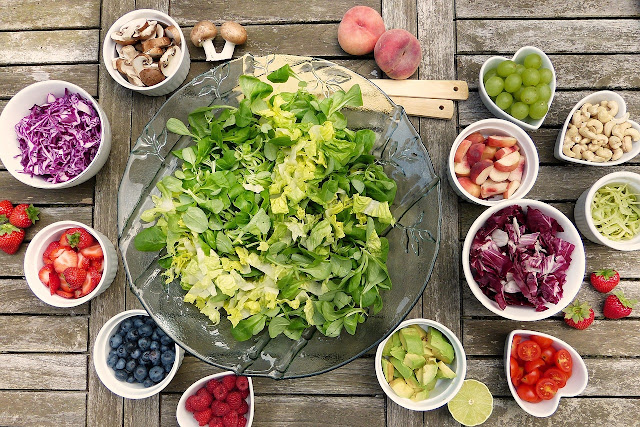Switching to a vegan diet can be an excellent decision for improving overall health and reducing environmental impact. However, it's crucial to take a well-planned approach to ensure that your body is getting all the necessary nutrients. A vegan diet can be very healthy, but only if it's done right. A poorly planned vegan diet can lead to deficiencies and negative health outcomes.
According to Dr. Michael Greger, a physician, and author who specializes in plant-based nutrition, "A well-planned vegan diet can meet all of our nutrient needs." But he also cautions, "just because it's vegan doesn't mean it's healthy." It's essential to eat a variety of whole, plant-based foods to ensure that you're getting all the nutrients your body needs.
In this blog post, we'll explore some of the basics of vegan nutrition, including protein, vitamins, and minerals, and how to ensure that you're getting enough of these nutrients on a plant-based diet. We'll also discuss the many health benefits of a vegan diet and why it's worth considering this dietary choice.
By taking a thoughtful and informed approach to vegan nutrition, you can enjoy all the health benefits of this dietary choice while ensuring that your body gets the nutrients it needs to thrive.
Dr. Greger: "The goal is not just to avoid animal products; it's to eat a diet that's as healthy as possible."
Protein
Protein is essential for maintaining and building muscle, repairing tissues, and supporting a healthy immune system. While many people associate protein with animal products, there are plenty of plant-based sources of protein as well. Some of the best vegan sources of protein include:
Legumes: beans, lentils, chickpeas, and peas are all excellent sources of protein, with around 15 grams of protein per cup.
Nuts and seeds: almonds, pumpkin seeds, sunflower seeds, and chia seeds are all good sources of protein, with around 5-7 grams of protein per ounce.
Whole grains: quinoa, brown rice, and oats are all good sources of protein, with around 5-7 grams of protein per cup.
Soy products: tofu, tempeh, and edamame are all high in protein, with around 10-20 grams of protein per serving.
Vitamins and Minerals
A well-rounded vegan diet should also include plenty of vitamins and minerals to support overall health. Some of the most important nutrients for vegans include:
Iron: Iron is essential for transporting oxygen throughout the body. Vegan sources of iron include dark leafy greens, tofu, lentils, and fortified cereals.
Calcium: Calcium is important for maintaining strong bones and teeth. Vegan sources of calcium include kale, collard greens, broccoli, almonds, and fortified plant milks.
Vitamin B12: Vitamin B12 is important for proper nervous system function and is not naturally found in plant-based foods. Vegan sources of B12 include fortified plant milks, breakfast cereals, and nutritional yeast.
Omega-3 fatty acids: Omega-3s are important for brain function and heart health. Vegan sources of omega-3s include flaxseeds, chia seeds, hemp seeds, and walnuts.
Health Benefits
A well-planned vegan diet can offer a number of health benefits, including:
Lower risk of chronic diseases: Studies have shown that vegans have a lower risk of heart disease, diabetes, and certain cancers compared to non-vegans.
Weight loss: Vegan diets tend to be lower in calories and higher in fiber than non-vegan diets, which can lead to weight loss.
Improved digestion: Plant-based diets are rich in fiber, which can improve digestion and promote regular bowel movements.
Better skin health: A vegan diet that is rich in fruits and vegetables can provide the body with a variety of antioxidants, which can improve skin health and reduce signs of aging.
Conclusion
Switching to a vegan diet can be a great way to improve your overall health and reduce your environmental impact. However, it's important to ensure that you're getting all the necessary nutrients to support your body's needs. By incorporating a variety of plant-based protein sources, along with a range of vitamins and minerals, you can enjoy the many health benefits of a vegan diet.
References
The Academy of Nutrition and Dietetics. (2016). Position of the Academy of Nutrition and Dietetics: Vegetarian Diets. Journal of the Academy of Nutrition and Dietetics, 116(12), 1970-1980. doi: 10.1016/j.jand.2016.09.025
Craig, W. J., & Mangels, A. R. (2009). Position of the American Dietetic Association: vegetarian diets. Journal of the American Dietetic Association, 109(7), 1266-1282. doi: 10.1016/j.jada.2009.05.027
Melina, V., Craig, W. J., & Levin, S. (2016). Position of the Academy of Nutrition and Dietetics: Vegetarian Diets. Journal of the Academy of Nutrition and Dietetics, 116(12), 1970-1980. doi: 10.1016/j.jand.2016.09.025


Comments
Post a Comment
We welcome your input!